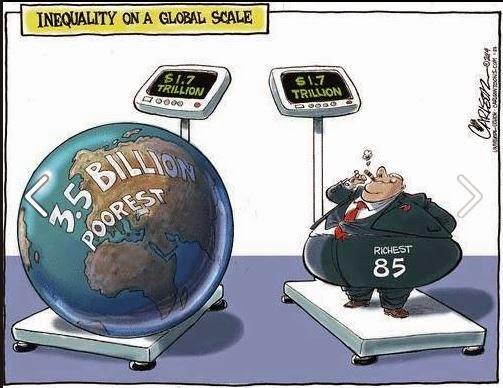
Essential Question: What is the role of politics in addressing inequalities between and within societies?
| Learning Outcome | Prescribed Content | Possible Examples |
| Debates surrounding development: challenges of globalization, inequality, and sustainability | Inequality and development: role of politics | Opportunities for and limits of state, IGO and NGO action, eg global regulation of MNCs and cross-border financial flows, role of local regulation of conditions of work, power of lobbies. |
Minds-On: Is inequality bad? Discuss.
By now it should be clear to all of us that development does not occur evenly around the world and that inequalities exist all levels of analysis. Some countries are clearly more developed and wealthier than others. Similarly within states there are inequalities between individuals and groups. Much talk is made by politicians and activists about income inequalities. A recent estimate from the anti-poverty NGO Oxfam reported that the world’s richest 1% earned 83% of the world’s income in 2018.
What do we do about inequality? Although absolute inequality is certainly bad, and absolute equality likely impossible, how much effort should we put into trying to address this issue?
To organize our discussion, lets divide the issue in two ways. First, we have inequality between societies. This is the international level between states. Second, we have inequality within societies at the national and local levels. How we address each type of inequality, and the extent to which they are equally important is a matter of significant debate in global politics.
Inequality Within Societies
Viewing Instructions: While you watch, take notes on the following issues;
- Limitations of the GINI coefficient.
- How inequality can be reduced.
- Factors that may create more inequalty within societies.
Source B: “France’s Yellow Vests’ Protests: Understanding the Collective Rage | The Dispatch,” The New York Times. 11 Dec. 2018.
Viewing Instructions: While you watch, record some of the perspectives of the Yellow Vest protestors. What is it that they are upset about? What are some concepts can we connet to what we are seeing here? What questions do you still have?
Guiding Question: The source points out that France appears to be a society that values equality, both in terms of culture and in terms of politics. If this is true, why did the Yellow Vest Movement protest against inequality?
Bonus: “Why the French are fed up (and what it means for Macron).” The Economist. 9 Apr. 2022.
Viewing Question: Why do some people in France appear to be upset with Macron? Is it because of inequality or is it becaues of globalization?
Source D: Moyo, Dambisa. “The Inequality Puzzle,” Project Syndicate. 18 Feb. 2016.
Discussion: Based on source D, and everything else you have learned so far about development specifically, and global politics in general, why do you think inequality is so difficult to reduce? Think about to the first source we looked at (Source A) which considered whether inequality is inevitable. Why do you think so little has been done in recent years to address this issue that seems to matter to so many people?
Case Study: Chaebols in South Korea
Inequality Between Societies
Source E: “Global inequality in living conditions,” Our World in Data
